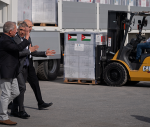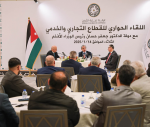You are here
Turning to prayer to bring peace
Jun 10,2014 - Last updated at Jun 10,2014
When people find themselves in difficult situations beyond the control of their human abilities, they often say only God can help. For decades this has been the feeling of many in our region with respect to prospects of settling the Arab-Israeli conflict peacefully.
So it is no surprise that with the failure of all earthly peace initiatives, many saw hope in Pope Francis’ gesture of inviting the Israeli and Palestinian Authority leaders to the Vatican to pray together for peace. In other words, Pope Francis, too, also believes that only God can help.
No one should doubt the Pope’s noble intentions or his genuine quest for peace. Neither should we fail to understand the significant symbolic meaning of the papal gesture.
Faith, which often heightens believers’ resolve to pursue their struggle to reach their goals without succumbing to adversity, does not usually comply with the rules of rational logic. But that does not mean that the hard facts that exist in the Holy Land — to use the relevant terminology — should be disguised while evaluating Pope Francis’ initiative.
One such fact is that one of the two leaders who was invited to pray for peace, Shimon Peres, is the president of Israel, which is primarily responsible not only for sowing the seeds of conflict in the region, but also remains, until this very day, the main obstacle in the way of any effort to achieve a just peace.
That obviously, does not apply to the other leader, Palestinian Authority President Mahmoud Abbas who, over the years, offered endless concessions to the Israelis in pursuit of a settlement, at the expense of his people’s rights.
Despite the proven futility of his tactics, Abbas continues to offer concessions, hoping that the results would be different. Abbas is right, therefore, to feel that he, too, is left with no other option but to appeal for God’s help.
Faithful believers worldwide pray to God for help and salvation in difficult times, but mainly when subject to natural disasters, which they often have no power to prevent or control, such as earthquakes, epidemics, floods and the like, but they do not pray for salvation from the evil they deliberately and viciously initiate, maintain, keep and prolong.
We know that the Israeli president who joined in the prayer has no much power in his hands now to influence in any constructive manner the behaviour of the current government of his country, but he has been an essential part of the Zionist project that deprived the region of peace and stability for the last seven decades.
Peres, moreover, has been personally implicated in horrific war crimes, like the 1996 invasion of Lebanon and the massacre of 106 people, including many children and UN peacekeepers in Qana.
For centuries before the Zionist invasion of Palestine, adherents to the Muslim, Christian and Jewish faiths lived in exemplary harmony with each other, compared to religious conflicts waged elsewhere, especially in Europe.
The question, which should always remain clear, is why we lost the peace, who is responsible for depriving the region and its people of peace and who continues to block the regional peace? Sadly, some like to gloss over the past and to bypass what they cynically call “the blame game”.
It is not a blame game. It is the essential diagnosis of the injustice that befell not only the Palestinian people, but many other peoples in the region as a direct result of the Zionist invasion of Palestine, the ongoing occupation and aggression, and the total denial of all the historic and inalienable rights of the Palestinians by Israel and its unprincipled supporters.
The reality is that peace is not impossible to achieve if there is respect for international law, justice for the victims of the Zionist project in the region, and political will on the part of the so-called international community to deal with Israel in the same manner it dealt with other rogue states that violate international law, occupy other countries and engage in constant wars of aggression.
The fear is that when history is blatantly ignored, reducing the historic injustice whose culprits are known to a mere prayer for peace may imply that we are in the region faced with a natural disaster, not a man-made crime for which there can be man-made justice as well.
Most certainly, Pope Francis must be aware of all the shocking facts, and that was gently reflected during his visit. It is unlikely, therefore, that either His Holiness or the many supporters of his inspiring move expected the prayer to have much effect in stirring the decades-long stagnant political swamp in the Middle East.
And yet, let us appreciate it as an initial hint for putting the great moral and religious weight of the papacy behind justice for those who have been deprived of it in the region.













